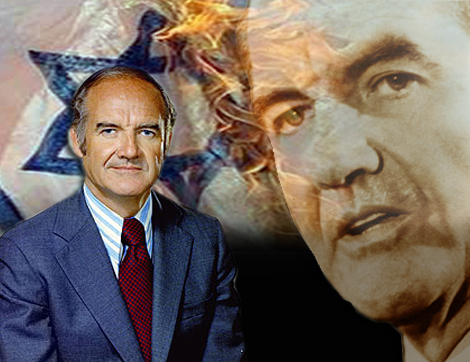
By Michael Collins Piper
Media tributes to George McGovern—the 1972 Democratic presidential candidate who died on October 19 at age 90—do not mention a significant, little-known fact about the three-term United States senator from South Dakota: After his 1980 re-election defeat, McGovern emerged as an outspoken critic of Israel.
From 1986, McGovern was associated with the Middle East Policy Council, which he chaired from 1991 to 1997, an association of academics, former diplomats and intelligence officers, who seek to redirect the “Israel-first” focus of U.S. foreign policy.
In 1991, McGovern admitted his congressional support for Israel came from “a combination of conviction and self-interest,” saying he and many colleagues were “constantly aware of the power of the lobby for that country. Sometimes, against our best instincts, we bowed to pressure.” Best remembered for riling New World Order advocates of American global meddling by urging U.S. withdrawal from the Vietnam War, McGovern adopted “Come Home America” as his 1972 campaign theme, echoing the America-first movement that opposed U.S. involvement in World War II where McGovern served as a decorated fighter pilot.
Although many smeared McGovern as a “communist” for his views on Vietnam, history shows a remarkable array of respected anti-communists—many of whom opposed U.S. involvement in World War II—also said it would be folly for the U.S. to engage in combat in Southeast Asia.
The list includes Sen. Bob Taft (R-Ohio), Father Charles Coughlin, Generals Robert Wood, Hanford MacNider and Bonner Fellers, publisher Col. Robert McCormick, GOP voices in the House such as Usher Burdick (N.D.), Clare Hoffman (Mich.) and Bruce Barton (N.Y.), Frank Hanighen, founder of the conservative weekly Human Events, nationalist Lawrence Dennis and historian Dr. Harry Elmer Barnes, among others. In 1961, General Douglas MacArthur—who knew a little about war in Asia—told President John F. Kennedy it would be a mistake for the U.S. to get involved in a land war in Asia.
Was McGovern a communist? Not hardly. However, the record shows that while he was still in the Senate, the Jewish lobby was suspicious of him.
As early as 1974, The Washington Post’s Stephen Isaacs noted in his book Jews in American Politics that a leading “New York intellectual” said McGovern “reminded the Jews of America’s only home-grown anti-Semites: the Populists.”
When McGovern condemned special interests, wrote Isaacs: “It sounded to Jews as if he were talking about them. Their concern about McGovern was the simple notion that Jews [had] figured in the life of big-city goyim—they [hadn’t] figured in the life of small-town South Dakota. . . . [He] had no personal stake in Jews. In short, they saw McGovern as a dumb goy—a Midwestern preacher— and he gave them bad vibes.”
Another Jewish writer said, “it did not take long for word to race through the Jewish community that McGovern would not be good for Israel.”
Hyman Bookbinder—a top influence peddler for the American Jewish Committee—warned McGovern’s support for racial quotas was dangerous to Jews—a revelation to those who believe the media claim that Jews were “allied” with blacks on civil rights issues.
On August 4, Martin Peretz, the stridently pro-Israel longtime publisher of The New Republic (TNR), told The Wall Street Journal (WSJ) that he bought TNR, “to take back the Democratic Party from the McGovernites,” but charged there’s been a resurgence of McGovernism, particularly toward Israel, under Barack Obama.
Peretz supports what the WSJ referred to as “a willingness to deploy military power to advance national interests and values” and “an abiding commitment to Israel as a mirror of American ideals”—a roundabout way of describing New World Order-style internationalism and imperialism.
And that’s precisely what McGovern opposed.
Michael Collins Piper is an author, journalist, lecturer and radio show host. He has spoken in Russia, Malaysia, Iran, Abu Dhabi, Japan, Canada and the U.S.



